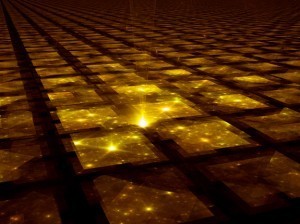An Infinity of Unique Universes? Maybe.
For many years I have unquestioningly accepted it when people (mostly physicists) say that in an infinite universe everything that can happen will happen – an infinite number of times - and our own little bit of the universe will exist somewhere else, in an infinite number of instances. It seems to make intuitive sense, yet one’s intuitions about infinity are rarely trustworthy, I find.
Also, I’ve never really asked myself what an infinite universe actually is. Is it infinite in spatial extent, infinite in temporal extent, infinite in both space and time, or infinite in neither but one of an infinite number of finite universes in an infinite multiverse? (And in what kind of a multiverse? There are several different possibilities.) I suppose this all comes from writing the third book in the Timesplash series (working title: FORESIGHT) for which I had to grapple with M-theory, multiple universes and the many worlds interpretation of quantum theory so that I could thread them into the story. I find such mental workouts leave me intellectually disturbed for a long, long time as my perspective on the cosmos slowly returns to normal.
Here’s the thing. If you regard our present known universe as arising from a sequence of quantum-level choices made by every single particle since the dawn of time, you have a situation where a universe is analogous to rolling a dice over and over again. Of course, a dice has just six sides and the universe we know has gazillions of particles (equivalent to a dice with as many sides as a gazillion times the number of possible states for each particle) but the principle is the same. If we keep rolling the dice an infinite number of times, we would expect every finite sequence (up to a certain length) to appear an infinite number of times. But that’s only if the universe doesn’t start out having infinite extent.
And that’s because, like our finite dice, a finite universe will only have a finite set of possible states after each moment in time – each throw of the dice. A spatially finite universe over infinite time should therefore yield an infinite repetition of sequences (up to a certain length – except, see below). But if the universe is spatially infinite, then, even over infinite time, it probably won’t repeat itself at all. We’d expect each sequence (each universe) to appear, on average, only once.
This appears to contradict the general supposition, stated in the first paragraph, that in a spatially infinite universe each part of the universe (below a certain size) should be replicated infinitely. Any length of time less than infinity should not even allow all possible universes to exist, let alone duplicates. It may, in fact, be an actual paradox to expect both in a spatially infinite universe with finite time. (Perhaps the paradox is resolvable by regarding such a cosmos as a universe which has an infinity of space-time events – the infinite spatial extent and the finite temporal extent naturally leading to the expectation of duplicated space-time events).
But I think this simply reflects the unrealistic assumption that the universe as we see it is just a random and static arrangement of a small number of types of particle over an infinite volume of space (or ditto for space-time events over an infinite 4D volume). The reality is not static but dynamic and is more like the dice throwing analogy in that the arrangement of parts arises from a process which unfolds over time. In finite time (with infinite space) momentary duplicates of the static state of parts of the universe may exist but in the moment before and the moment after, the duplicates may not exist.
In fact, there’s another argument that may lead to infinite unique universes rather than infinite duplicates. Not all states of a particular universe may be reachable from some states of another (or the same) universe. This would be true, say, if there really is an arrow of time – i.e. it runs only in one direction – and the 2nd Law of Thermodynamics is inviolable. There may be no route (no sequence of throws of the dice) from a scrambled egg to the whole egg that preceded it. If you scramble an egg (or, in fact, if you do nothing at all and simply let entropy take its inevitable course) you may have barred the existence of the preceding state of the universe forever.
All said and done, I’m not so ready any more to believe people when they say, “In an infinite universe you and I are having this same conversation somewhere else.” Is there a physicist in the house who might be able to point out the errors in my argument? Or another sci-fi writer? Or anybody else who thinks about this stuff in the middle of the night when they should be sleeping?

Mmmmm, braaaaanes!



